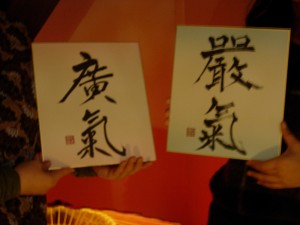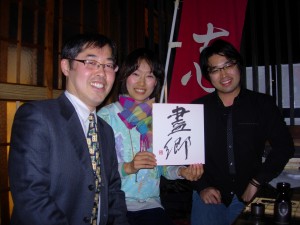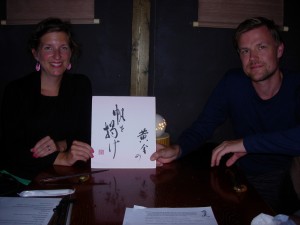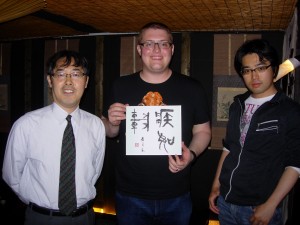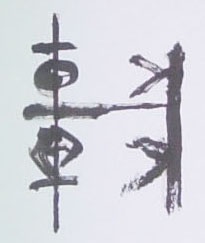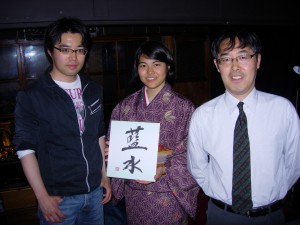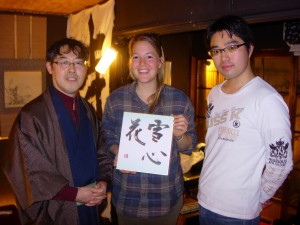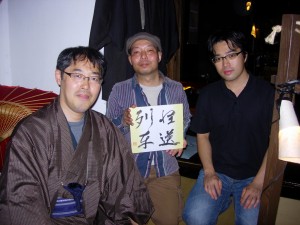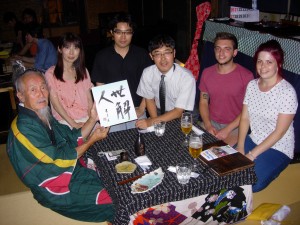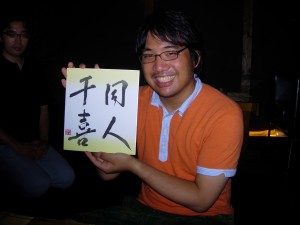2015年10月17日(土)、京都烏丸御池の「Samurai Cafe & Bar SHISHIN(士心)」にて字天ナイトを開催いたしました。
当日のライブの、活動報告です。
今回の字天ナイトもまた書家の八木翠月先生にご臨席いただき、小田の「新ことば」を即興で書にしたためていただきました。
当日は、四名のみなさんに「新ことば」をお送りいたしました。二名の方は一文字なので厳密には「新ことば」と言えませんが。
本文は、皆さんにお送りしたレターに従って、全て英語で掲載いたします。
まず、AustraliaのSydneyから来られたKane Manganさんへの新ことば「螭魅力(ちみりょく、chimiryoku)」です。
—————————
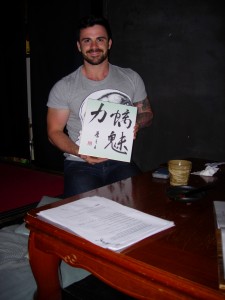
You gave me “amazing”, “be who you want to be”, and “enjoy life” as your most favorite words or phrases.
I tried to choose difficult Kanji characters that could imply amazing, free, and joyful.
The word “螭魅 (chimi)” should be very difficult and unfamiliar even for Japanese people.
It means “water dragon (螭)” and “enchanting monster (魅)” in separate. Adding together “螭魅” means simply “monster”.
But I attached one more Kanji character “力 (ryoku)”, that means ‘power’.
“魅力 (miryoku)” is a quite positive phrase, that means ‘charm, appeal’, like a monster using an enchanting magic.
So “螭魅力” can mean totally ‘the power of a charm like monsters’.
It is the new word I created only for you.
次に、ヨーロッパから来られたお二人の方に創案した新ことば「
育徳(いくとく/ikutoku)」です。
実名公表不希望でいらっしゃるので、名前は記載いたしません。/ I don’t show their names because they don’t wish to post them on this blog.
—————————
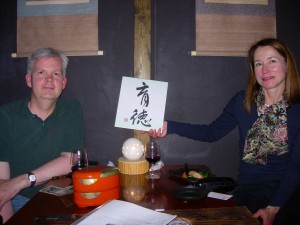
I took these Kanji from ancient Chinese philosopher Lao-zi (老子).
道生之、徳畜之、長之育之。 (“Lao-zi”, Chapter 51)
(Rough meaning: “The road of the universe [道] gives birth to everything. The virtue of the universe [徳] nourishes everything. They grow it up, and raise it up.
Kanji “育 (iku)” means ‘to raise up’.
Kanji “徳 (toku)” means ‘the virtue’.
I chose them from Lao-zi’s above phrase and put them in a row.
“育徳 (ikutoku)” can mean ‘the virtue of raising (everything) up’.
There are two pillars of schools of thought in ancient Chinese philosophy. One is Confucius(孔子)’s school (Confucianism), and other is Lao-zi’s school (Taoism). Confucianism appreciates the order of human society, on the other hand Taoism appreciates the potential the nature itself has. Lao-zi says that the universe and the nature have the authentic power to create everything, that is the virtue of the universe and the nature (徳). Lao-zi’s philosophy has become one of origins in East Asian liberalistic thoughts as well as Zen Buddhism (禅).
You indicated the favorite words of you like “non-judgement”, “learning” and “evolving”.
According to your request, I chose Kanji from East Asian liberalistic and nature-loving philosopher.
次に、United StatesのAlbuquerqueから来られたLuke Loganさんです。
Loganさんは「忍舞台芸術協会」のExective Directorでいらっしゃって、全米に多くの生徒がおられるということです。当日は以前に新ことばをお贈りした
ジョー岡田さんも「士心」に来店しておられて、ジョーさんの薦めをいただきLoganさんに「
忍(にん、しのぶ、しのび/nin, shinobu, shinobi)」の一文字を翠月先生に書き起こしていただきました。
—————————
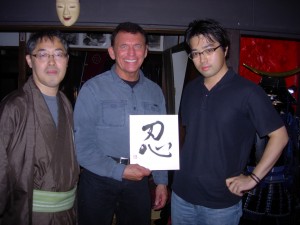
On Oct 17 we gave you our kanji calligraphy. It is “忍”. It can read in three ways – If read as “Nin”, it means a noun that can be a part of complex words like “忍術 (Ninjutsu, the art of Ninja)”, “忍者 (Ninja, it is what you well know”, or “忍耐 (Nintai, perseverance)”. If read as “Shinobu”, it means a verb to indicate ‘to persevere’. “Shinobu (しのぶ or 忍)” is also one of popular Japanese female given names. If read as “Shinobi”, it is an alternative noun for “忍者” in original Japanese language (“忍者” is a Chinese loanword).
The character “忍” consists of two parts.
Its upper part (刃) means ‘blade’, whose pronunciation is “やいば(yaiba)”.
Its lower part (心) means ‘heart’ , whose pronunciation is “こころ(kokoro)”.
It is really a suitable kanji character for Ninja, isn’t it?
次に、United KingdomのLondonから来られたAngelika Tobias-Freitagさんです。
Angelikaさんもジョーさんの進めをいただき、思いのある一字として「
刀(かたな、とう/katana, To)」を翠月先生に書き起こしていただきました。
—————————
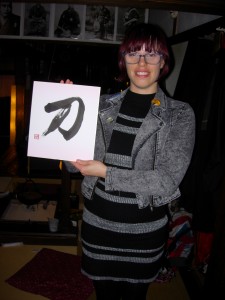
Japanese sword is called “刀(かたな, Kanata)” or “日本刀 (にほんとう, Nihonto)”.
Katana is a one-side-blade sword, whose origin dates back to Heian Era (8c – 12c).
Back to older days, Japanese sword was a two-sides-blades style, that was the standard of China and East Asia.
But in Heian Era, a new warrior class started to develop. It was called “武士 (ぶし, Bushi)” or “侍 (さむらい, Samurai)”. They possessed reclaimed lands in rural areas and resorted to battles in order to keep them. They rode on the back of a horse, wore full armors, and fought each other. To fight on a horseback, a one-side-blade sword with a long reach was advantageous. So Bushi started to use Katana. It was firstly used in Eastern Japan, and spread all over the country later. After Bushi seized the power to control Japan (it was after the end of Heian Era, 12c), Katana became the supreme symbol of Bushi’s braveness and nobleness. Later in Sengoku Era (15-16c) soldiers on foot took larger roles in battles than horse-riders, and spears (槍, yari) and rifles (鉄砲, teppo) became the most effective weapons. Even so, Bushi in that era loved Katana and developed a martial art using Kanata, that is called “剣術 (けんじゅつ, Kenjutsu)”. Bushi had a rule to wear two Katana, long one and short one. The long one is called “太刀 (たち, Tachi)”, or simply called Katana. It was regarded as a weapon to fight. The short one is called “脇差 (わきざし, Wakizashi)”. It was regarded as a sword to cut enemy’s head in Sengoku Era, and later in Edo Era (17c-19c) it was regarded as the symbolic sword to take suicide to cut himself on the belly – Seppuku or Harakiri. Bushi was expected to have a braveness as well as to have a responsibility of the ruling class, so they always wore two types of Katana.
“刀” is one of the simplest Kanji characters. It symbolizes the shape of a sword. Calligrapher Yagi Suigetsu drew it nicely.
「新ことば」Live字天ナイト at Samurai Cafe & Bar SHISHINは、来月も開催する予定です。
またとない体験を、皆さんもどうかお試しください。初見の方、大歓迎です!
